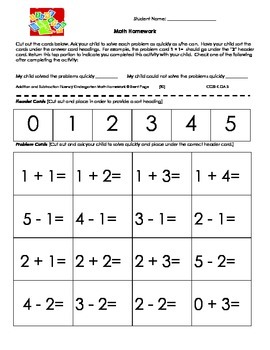

This can be a list, a chart, or even a calendar! You can send this list home to give families options and give kids some choice in their assignments.
#MATH KINDERGARTEN HOMEWORK FULL#
Then create a list of 15 – 20 choices full of skills you want your students to practice. Think about your academic goals for the week or the month. There are so many fun possibilities! Give Families Homework Options! Play games with dice to develop number sense and social skills like taking turns. Practice writing letters and numbers in sand, finger paint or shaving cream! Create math problems with toys or breakfast cereal.

Think about how you design engaging centers and apply that to homework. Keep “assignments” fun and engaging with a variety of ways to practice important foundational skills. You can differentiate homework by giving students options and allowing families to choose the activities that are the best fit for their students. Sending the same worksheet with each student is not differentiating. In school, we know that all kids have different learning styles so we need to remember this when assigning homework. They don't need to go home to sit with worksheets and pencils to continue to practice sight words (which the latest brain research doesn't support anyway, but that's a blog post for another day). Kids work hard all day (or for half the day) at school. In distance learning or remote learning situations, teachers are under even more pressure! Check out this page for some distance learning types for Kindergarten teachers. So what can teachers do to help their young students to practice skills at home but still allow them to be kids? We can start by giving students a variety of homework options rather than requirements. The problem is that we've lost sight of what we know is natural child development. Sharing learning responsibilities with families is a productive way to help students achieve and giving parents activities and skills to practice at home is certainly helpful. Then parents decided that they need kindergarten homework to help them to achieve this goal. Then that pressure was transferred to teachers who decided that in order to achieve this goal, they needed to share the responsibility with parents. That is why we recommend lamination of game elements, they are nicer to touch and a child will like to play with them again and again.The pressure put on teachers to have all kindergarten students meet the same high academic standards at the same time is completely unrealistic. Printable games with single game elements are more attractive for kids: for example, they like taking carrots with fingers and putting them into a basket more than count them in the picture. Mix math tasks with pre-writing and sport activities, puzzles or memory games, in order not to tire children with learning. The only way to get kids interested in learning is to make learning a funny game. They cannot concentrate on one task for a long time and their activity need to be changed every time. Doing mathematic tasks on different topics, children gain various knowledge about the world around and enrich their vocabulary.Ĭhildren at preschool age are very active.Numbers coloring pages improves imagination and creativity.Math pre-writing sheets develop graphomotor and fine motor skills.Counting activity also improves speaking skills.Most printable math games consist of small game elements, using those children develop fine motor skills (cutting out, selecting and fixing game items with clothespins).Math activity can develop comprehensively another essential skills, e.g. Doing patterns, children can make predictions and logically continue a chain, because they understand what comes next.Īdvantages of math activities for preschoolers
#MATH KINDERGARTEN HOMEWORK HOW TO#

Matching and comparison games to be able to compare quantities: more, less or equal.Addition and subtraction play activity sheets for kindergarten or homeschool.Worksheets to learn basic math correlation like «number-quantity», «object-shape».Math brain-teasers to improve spatial intelligence by preschoolers.Preschool games to learn basic geometric shapes (square, circle, triangle, ellipse, etc.).Pre-writing sheets to develop number writing skills.Educational games to learn counting up to 5, up to 10 and up to 20.Learning cards to get acquainted with numbers.What are WUNDERKIDDY math worksheets pre-k? Using our kindergarten math worksheets, you find an easy way how to teach math concepts and numbers to preschoolers and even ways to teach numbers with from 2 years old. WUNDERKIDDY math worksheets for kids are well suited for kindergarten activities.


 0 kommentar(er)
0 kommentar(er)
